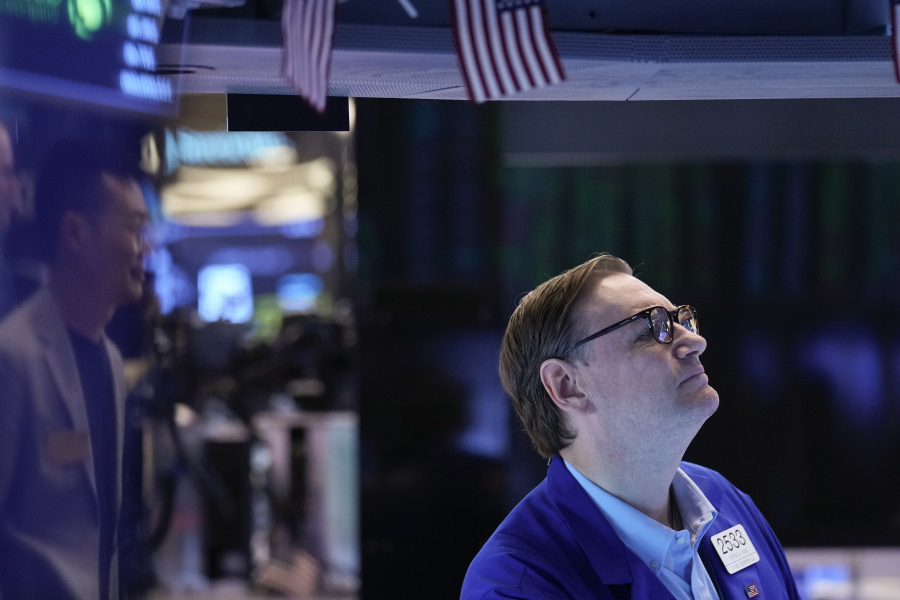NEW YORK (AP) — Stocks stumbled on Wall Street Friday, bringing the S&P 500 10% below the peak it reached in July and putting the benchmark index into what’s called a “correction.”
The S&P 500 fell 0.5%, or 19.86 points, to close at 4,117.37. That marks its 10th loss in the last 12 days. The Dow Jones Industrial Average fell 366.71 points, or 1.1%, to 32,417.59.
The Russell 2000 index of smaller company stocks slipped 20.07 points, or 1.2% to 1,636.94, its lowest level in about four years.
The Nasdaq was the bright spot in the market, gaining ground on the strength of several big technology and communications companies that reported solid earnings. The index rose 47.41 points, or 0.4%, to 12,643.01.
Amazon rose 6.8% following its profit report. Both its profit and revenue for the summer were better than expected. As one of the most massive companies on Wall Street, Amazon’s stock movements carry huge weight on the S&P 500 and other indexes.
It’s one of the “Magnificent Seven” Big Tech stocks that was responsible for much of the stock market’s climb early this year. But those huge gains also meant big expectations built for them, and Alphabet, Meta and Tesla all fell sharply following their latest reports.
Intel, which is outside the Magnificent Seven, was also helping to support the market. It rose 9.3% after reporting much stronger profit for the summer than analysts expected.
Those gains weren’t enough to counter declines elsewhere from other technology companies and energy companies. Investors also dealt with mixed readings on the economy.
Stocks have struggled recently for a couple of reasons: Several Big Tech stocks tanked following profit reports for the summer, and rising Treasury yields in the bond market tightened their vise on Wall Street.
“What you have is an oversold market, by any metric,” said Quincy Krosby, chief global strategist for LPL Financial. “That typically leads to a significant rally, but the question is, does that bring you to the end of the year.”
Big Tech stocks have faced an additional challenge from the big rise in Treasury yields since the summer. When bonds are paying more in interest, prices for most investments fall because investors suddenly have more alternatives for their dollars. Among the hardest hit are stocks seen as the most expensive or requiring their investors to wait the longest for big growth. That tends to hurt stocks in Big Tech, biotechnology and other high-growth areas in particular.
The yield on the 10-year Treasury held steady at 4.84%.
Several big companies slipped after reporting disappointing earnings for their latest quarters. Exxon Mobil fell 1.9% after reporting a bigger drop in profits than Wall Street expected. Chevron fell 6.7% after also falling short of analysts’ profit forecasts.
Ford stumbled 12.2% after reporting disappointing earnings and revenue a day after it reached a tentative contract agreement with the United Auto Workers union.
The market has been unforgiving when it comes to the latest round of corporate earnings, though they have mostly been solid, said Krosby. Analysts polled by FactSet expect earnings growth of about 2.4% overall for companies in the S&P 500.
“This market has been looking at every single component of what companies are saying,” Krosby said. “You could see this is a market that is very careful about rewarding companies.”
A report showed that the measure of inflation preferred by the Federal Reserve remained high last month, but within economists’ expectations. It also showed spending by U.S. consumers was stronger than expected, even though growth in their incomes fell short of forecasts.
A separate report said that U.S. consumers’ expectations for inflation in the coming year are rising, up to 4.2% from 3.2% last month. That’s particularly concerning for the Federal Reserve, which fears such expectations could lead to a vicious cycle that worsens high inflation.
Added all together, the data didn’t change Wall Street’s expectations much for the Federal Reserve’s next move on interest rates.
The Fed has yanked its main interest rate above 5.25% to its highest level since 2001 in hopes of slowing the economy and hurting investment prices enough to starve high inflation of its fuel. But it’s been on hold recently, keeping rates steady at its last meeting in September.
The overwhelming expectation is still for the Fed to hold rates steady again next week, and Wall Street is beginning to prepare for rates to stay high for a long time.
The 10-year yield has been catching up the Fed’s main overnight interest rate as the economy remains remarkably solid and as worries rise about how much debt the U.S. government is taking on to pay for its spending.
The swift rise, up from less than 3.50% in the spring to more than 5% earlier this week, has sent prices tumbling for older bonds already trading in the market.
In the biggest picture, the “bond bubble has popped” following years of ultra-low yields, according to Michael Hartnett, investment strategist at Bank of America.
But he also warned that markets can remain stuck in trading ranges for a long time following bubble bursts before making major recoveries, such as Japanese stocks after 1989 or internet stocks after 2000. He said in a BofA Global Research report that bond yields may not have a long-term run back lower until Washington, D.C. gets “serious about fiscal discipline.”
In stock markets abroad, indexes were mostly lower in Europe after rising more solidly in much of Asia.



